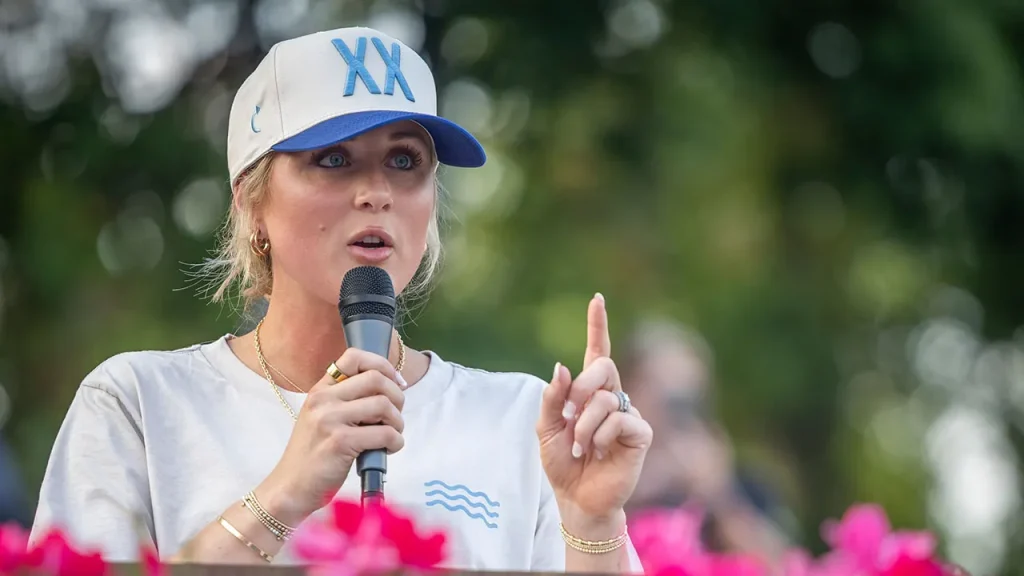Gaines Takes on AOC: A Battle Over Women’s Sports and Political Virtue Signaling
Riley Gaines, former collegiate swimmer and new mother, found herself in a heated social media exchange with Representative Alexandria Ocasio-Cortez this week, highlighting the growing tension between traditional women’s rights advocates and progressive politicians. During her appearance on “Fox & Friends” Wednesday morning, Gaines responded to AOC’s personal attacks against her, which began when the Democratic Representative attempted to mock Gaines’ swimming career. Despite Gaines’ impressive record as an All-SEC honoree at the University of Kentucky, AOC’s dismissal of her concerns about competing against transgender swimmer Lia Thomas during the 2022 NCAA Championships sparked a public confrontation that reveals deeper cultural divides in American politics.
The conflict escalated when Gaines challenged AOC to a debate during an appearance on “The Ingraham Angle.” Instead of accepting, AOC responded by telling Gaines to “get a real job,” seemingly dismissing Gaines’ advocacy work and her role as a new mother. Gaines, who recently gave birth to her daughter Margot in September, countered that motherhood is “the most important and rewarding job in the world.” This exchange exemplifies the different value systems at play – with Gaines representing traditional family values and women’s sports protection, while AOC represents a progressive stance that prioritizes transgender inclusion in women’s athletics.
During her Fox News appearance, Gaines recalled a striking moment at President Trump’s joint address to Congress earlier this year. She described how, following a vote on keeping biological males out of women’s sports, she observed Democratic senators wearing pink to symbolize their support for women. The irony wasn’t lost on Gaines, who pointed out that just a day before, “every single Democratic senator voted in opposition of protecting girls in sports.” This visual contrast between stated values and voting records formed the crux of Gaines’ criticism, as she characterized such behavior as “virtue signaling at its finest.”
The disagreement between Gaines and AOC represents more than a personal spat; it embodies the national debate over the balance between transgender rights and protections for women’s sports. Gaines, who now hosts OutKick’s “Gaines For Girls” podcast, has become a prominent voice advocating for maintaining sex-based categories in athletics. Her experience competing against Lia Thomas, a transgender woman who had previously competed on the men’s team, has fueled her activism. Gaines argues that biological differences create inherent competitive advantages that can’t be dismissed in the name of inclusion, while progressive politicians like AOC maintain that transgender women should be fully included in women’s categories.
The exchange also highlights the changing nature of political discourse in America. AOC’s refusal to engage in substantive debate and her resort to personal attacks on social media exemplifies what Gaines described as “ridiculous rhetoric” that “may work on social media, but doesn’t fly in the real world.” This sentiment reflects growing frustration among conservatives who feel that complex policy discussions are being replaced by performative politics and simplistic characterizations. Gaines specifically pointed to what she sees as hypocrisy, noting that Democratic lawmakers claim to stand for women while voting “against our rights to equal opportunity, to safety in our sports, voted against our rights to privacy in areas of undressing.”
As this public disagreement continues to unfold, it serves as a microcosm of larger cultural battles taking place across America. On one side stand advocates like Gaines who believe that biological sex differences matter in competitive sports and that protecting women’s athletic opportunities requires sex-based categories. On the other side are progressives who prioritize gender identity over biological sex in determining access to sports categories. The inability of these sides to engage in productive dialogue – as evidenced by AOC’s unwillingness to debate Gaines and resort to personal attacks instead – suggests that resolution remains distant. Meanwhile, OutKick’s attempt to get comment from Ocasio-Cortez’s office went unanswered, further underscoring the communication gap between these competing viewpoints in America’s increasingly polarized political landscape.















